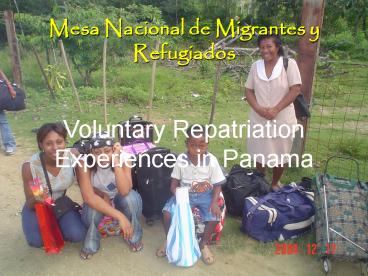Diapositiva 1 PowerPoint PPT Presentation
Title: Diapositiva 1
1
Mesa Nacional de Migrantes y Refugiados
Voluntary Repatriation Experiences in Panama
2
PANAMANIAN REFUGEE POLITICS CONTEXT
- Panamanian government recognizes two different
cathegories in refugee matters - - Asylum seekers who could become oficial
refugees after a series of processes and that
reunite the conditions established by 1951
Convention refugee definition. - - Massive groups of people who enter Panama
because of the general violence generated in
Colombia who, according to our government, dont
fit in the definition of 1951 Convention. So in
Decree 23 of 1998, a special protection cathegory
was created Temporary Protection Humanitarian
Status. - - There are aproximately 950 Colombian people
living in border areas which are considered
temporary protected people. - - Of the approximately 200,000 Colombian
inmigrants in Panama City. Theres an estimate
number of 30 to 60,000 that reunite the
conditions to claim refugee in Panama but are
invisible numbers.
3
PANAMANIAN POLITICS IN MATTER OF VOLUNTARY
REPATRIATION
- Generally speaking, both Panamanian and Colombian
government in most of the cases havent made an
agreement to establish guidelines that develop a
fair voluntary repatriation process. - Voluntary repatriation is, according to our
country, following the UNCHR guidelines, the best
alternative to be applied to the Colombian
population under the temporary protection status. - Violence (active and passive) of government
authorities toward refugees is a constant
practice. The violation of the will of returning
to Colombia is a frequent practice.
4
VOLUNTARY REPATRIATIONS
- 1997. Aproximately 300 Asylum seekers who lived
for 2 months in the communities across the River
Tuira were deported to Cacarica and came back to
Panama. - Decree 23 of 1998. Temporary Protection Statute
5
VOLUNTARY REPATRIATIONS
- 2000. There were 3 repatriations. UNHCR
facilitated the repatriations. There wasnt an
established or organized process. - 2001. Tripartite agreement (Panamanian and
Colombian government with the UNHCR) in which
voluntary repatriation guidelines were
established. - 2001. September repatriation (40 people)
6
VOLUNTARY REPATRIATIONS
- 2001. Attacks in Juradó
- 2001. December repatriation process suspended.
21 people were supposed to return to Colombia. - 2002 2003. Government Politics toward asylum
seekers, temporary protection population and NGOs
hardened (national politics toward refugees
aligned with regional and international politics)
7
Voluntary Repatriation2003 Context
- April 23, 2003. Massive deportation from Punusa
(109 people were deported including 60 children
and panamanians) - Massive deportation hidden agenda of the
Panamanian and Colombian goverments with the
Colombian temporal protected people - Precautionary measures requested by NGOs and
granted by the Human Rights Inter-American
Commission
8
VOLUNTARY REPATRIATION 2004 CONTEXT
- 2004. NGOs actions
- 2004. Government compromises and voluntary
repatriation in Jaqué observed by NGOs and the
international community - 2005. Voluntary repatriation in Boca de Cupe,
River Tuira
9
MESA NACIONAL DE MIGRANTES Y REFUGIADOS
- 2004. Creation (Coalition of 8 Panamanian NGOs
working for inmigrants and refugees protection)
10
VOLUNTARY REPATRIATION
- 2006. New entrances and government politics
toward them (Theres a risk of deportation of 48
people from native origins that came to Panama
seeking asylum and are living in Jaqué (Darién)
right now because it seems that the government
doesnt want to recognize them neither as
refugees nor as temporary protected people).
11
RECOMMENDATIONS
- Panamanian and Colombian authorities (Foreign
Affair Ministries) and the UNHCR have to define
guidelines to guarantee fair voluntary
repatriation processes - Panamanian NGOs have the challenge to narrow the
communication channels with the government and
make actions of advocacy and lobbying with the
government and the UNHCR, actively taking plan in
voluntary repatriation processes not only as
observers but also sensitizing the government and
the society. - NGOs have to be alert of the government
treatment of new incomings so we could acess the
Interamerican Comission proceedure in case of
deportations, requestion precautionary measures. - Panamanian NGOs need funds to have a permanent
presence in the border areas and to visibilize
the real number of Colombian refugees in Panama
City through a diagnosis of its population. - UNHCR needs a more active presence sensitizing as
well as to guarantee that the voluntary
repatriation guidelines are followed by the
governments.
12
Comunidades Receptoras
- Yaviza
- El Real
- Yape
- Boca de Cupe y Alto Tuira
- Jaqué
- Metetí
- La Palma
- Alto Chucunaque
- Puerto Obaldía

